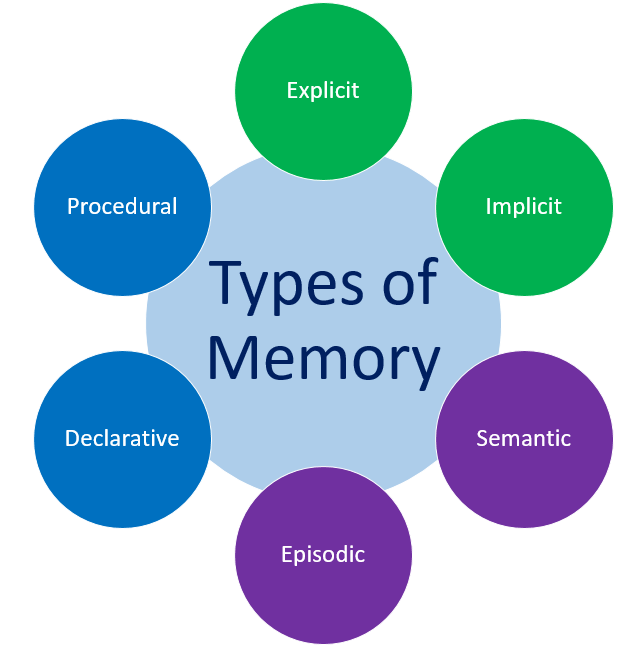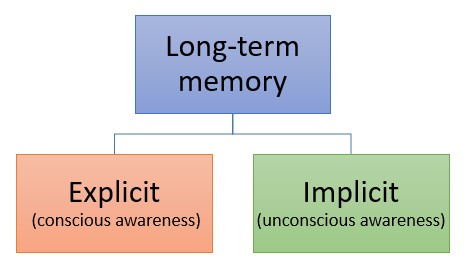Types of Memory
Memory is the mental function that enables you to acquire, retain, and recall sensations, impressions, information, and thoughts you have experienced.
Types of Memory
There are three basic categories for Types of Memory:
Sensory Memory – Holds information coming in through the senses for a period ranging from a fraction of a second to several seconds.
Short-Term Memory (STM) – Holds information we are actively thinking about for about seven items for no more than 20 or 30 seconds at a time without rehearsal.
Long-Term Memory (LTM) – Holds information for a long period of time (almost permanently) with a virtually unlimited capacity.
However, there are several additional types of memory.
- Implicit vs. explicit memory
- Declarative vs. non-declarative memory
- Declarative vs. procedural memory
- Semantic vs. episodic memory
Types of Short-Term Memory
Short-term memory is the information we are currently aware of or thinking about. It is the information that is held in our mind for a very short period of time before it is either dismissed or transferred to long-term memory. Working memory can be thought of a distinct segment of short term memory.
Working memory – is a subpart of short-term memory applied to cognitive tasks that temporarily stores, organizes and manipulates information.
Types of Long-Term Memory
Long-term memory is our brain’s system for storing, managing, and retrieving information. We store different types of information (procedures, personal experiences, facts, language, etc.) in our long term memory. There are three main distinctions among different types of memory:
- Implicit vs. Explicit memory
- Declarative vs. Procedural memory
- Semantic vs. Episodic memory
Types of Memory
Implicit vs. Explicit Memory
Implicit memory is information that is remembered unconsciously and effortlessly. Information unconsciously enters the memory to affects thoughts and behavior, thus allowing someone to do things by rote. It is where previous experiences aid in the performance of a task without conscious awareness of these previous experiences.
Example: If you visited your aunt’s house when you were eight years old, then 20 years later you remember exactly how to get to the kitchen.
Explicit memory is conscious, intentional remembering of information. Basically, it is information that you have to consciously work to remember.
Example: Remembering a phone number or an address.
Declarative vs. Procedural Memory
Declarative memory is recall of factual information such as dates, words, faces, events, and concepts.
Example: Remembering the capital of Connecticut, the rules for playing football, and what happened in the last game of the World Series involves declarative memory.
NOTE: Declarative memory is usually considered to be explicit because it involves conscious, intentional remembering.
Procedural memory is recall of how to perform an action, task, or skill.
Example: changing a light bulb or riding a bike
NOTE: Procedural memory is usually considered implicit because people do not have to consciously remember how to perform actions or skills.
Semantic vs. Episodic Memory
Declarative memory can be segmented into two types: semantic and episodic
Semantic memory is recall of general facts.
Example: Remembering the capital of New Jersey and the batting average for Jackie Robinson.
Episodic memory is recall of personal experiences.
Example: Remembering what happened in the happened during a birthday party or baseball game.




